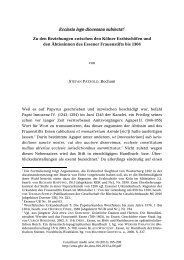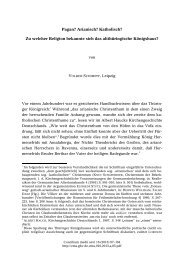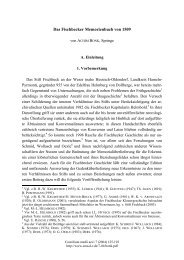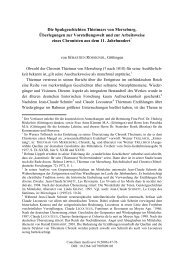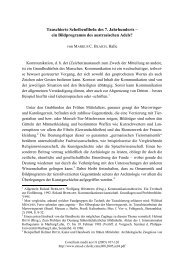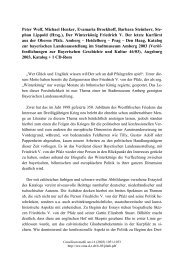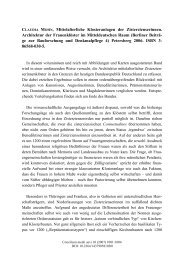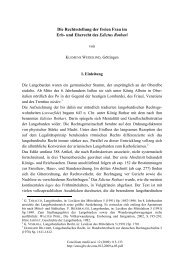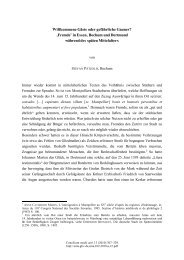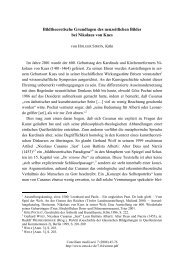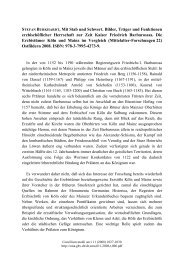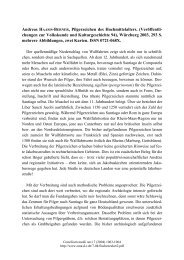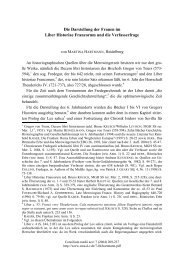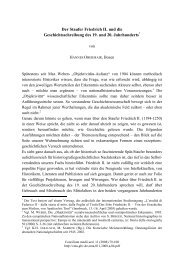Rabanus Maurus - Concilium medii aevi
Rabanus Maurus - Concilium medii aevi
Rabanus Maurus - Concilium medii aevi
You also want an ePaper? Increase the reach of your titles
YUMPU automatically turns print PDFs into web optimized ePapers that Google loves.
20<br />
FEE-ALEXANDRA HAASE: Rhetoric as praise of the emperor<br />
super dicendoatque tacendo, uno versiculo comprehensam, tibi filio meo, Stephano,<br />
traderecuravi. Versiculus hic est: Quis, quid, cui dicas, cur, quomodo, quando,<br />
requiras. 36<br />
But the language no one can control: that is why I, Albertanus, made a concise<br />
teaching advice about speaking and silence only in one verse for you, my son,<br />
Stephanus. The little verse is the following: Who, What, to whom you speak, why, in<br />
which way, when is required.<br />
In De rerum naturis (Book 5) Rhabanus describes the oration (oratio) in De<br />
oratione et ieiunio:<br />
5.13 De simbolo<br />
[14] De oratione et ieiunio<br />
Oratio petitio dicitur, nam orare est petere, sicut exorare in petrare. Constat autem<br />
oratio loco et tempore […]. 37<br />
About the symbol<br />
About the oratio<br />
The oratio is called a petition, because orare means to make a petition, just like<br />
‘exorare’ in ‘petrare’. But the place and time of the oratio are fixed.<br />
Clement of Alexandria looked for meaning on four plains, the natural, the mystical,<br />
the moral, and the prophetic. The threefold sense as used by Origen included the<br />
allegorical, the tropological, and the analogical, to which Rhabanus <strong>Maurus</strong> also added<br />
the historical. The Pietistic method of interpretation is similar but the rules of grammar<br />
and the common meaning and usage of words are discarded and the eternal light of the<br />
spirit is held to be abiding and infallible Revealer. The problems start when<br />
interpreters have contradictory revelations because each person has no authority but<br />
himself, and his own subjective feeling or fancy is the end of the controversy.<br />
Rhabanus speaks in the preface of De rerum naturis (preface 1) about the invention<br />
of the manifestation of history (hystoriae) and allegory (allegoriae): Et sic satis facere<br />
quodammodo posset suo desiderio in quo et hystoriae et allegoriae inueniret<br />
manifestationem. 38 Carl Joachim Classen already mentioned that Marurs in his De<br />
36 http://www.thelatinlibrary.com/albertanus/albertanus.arsloquendi.shtml.<br />
37 De rerum naturis. Book 5. http://www.mun.ca/rabanus/drn/5.html. [7.7.2004]<br />
38 Cf.: http://www.mun.ca/rabanus/drn/pref1.html. [7.7.2004]



